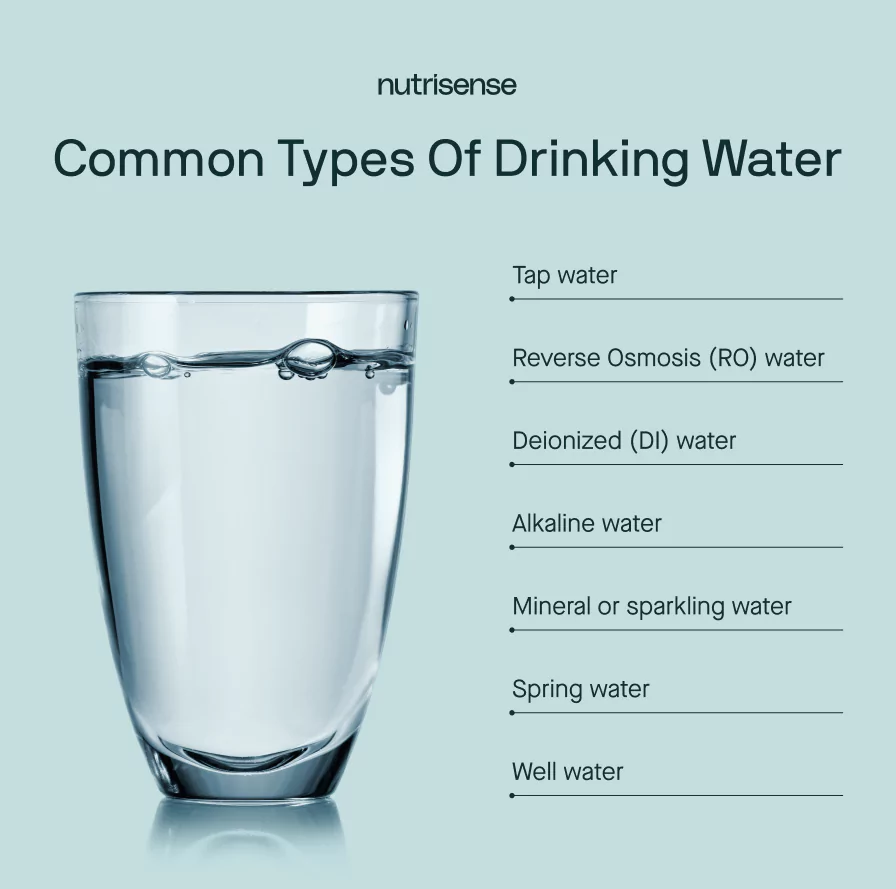
Water is vital for our health and well-being. It helps to regulate body temperature, remove waste, and lubricate joints. But with so many options available, which type of water is the best for optimal health?
Purified water is one of the top choices for good reason. Through a process of filtration or distillation, impurities, chemicals, and contaminants are removed, leaving behind clean, pure water. This ensures that you are consuming water that is free from harmful substances and safe for consumption.
Spring water is another great option. It is sourced from natural springs and is known for its refreshing taste. Spring water is rich in minerals such as calcium, magnesium, and potassium, which are essential for maintaining proper bodily functions. Drinking spring water can help replenish these vital minerals and promote overall health.
- The Importance of Hydration for Optimal Health
- Why Is Water Essential for Our Bodies?
- 1. Hydration
- 2. Nutrient Absorption
- The Role of Water in Digestion and Nutrient Absorption
- The Impact of Water on Energy Levels and Brain Function
- Choosing the Right Water for Your Health
- Filtered Water
- Spring Water
- Different Types of Water and their Benefits
- The Best Water Sources for Optimal Hydration
- 1. Filtered Water
- 2. Mineral Water
- 3. Spring Water
- 4. Coconut Water
- 5. Infused Water
- Q&A:
- What is the best water to drink for optimal health?
- Why is filtered water or natural spring water the best for optimal health?
- What are some benefits of drinking filtered water or natural spring water?
- Is tap water a good option for drinking?
- What is the difference between filtered water and natural spring water?
The Importance of Hydration for Optimal Health
Proper hydration is essential for maintaining optimal health. Water makes up a significant portion of our body and plays a crucial role in various bodily functions.
Hydration is essential for regulating body temperature, lubricating joints, and supporting the optimal functioning of organs and tissues. Additionally, water helps transport nutrients, oxygen, and waste products throughout the body.
Dehydration can have severe consequences on our health. It can cause fatigue, dizziness, and difficulty concentrating. Prolonged dehydration can lead to more serious issues, such as kidney stones, urinary tract infections, and even kidney failure.
Drinking an adequate amount of water is especially important during physical activity and in hot weather when we are prone to sweating and losing fluids. It is recommended to drink water before, during, and after exercising to prevent dehydration.
While water is the best choice for staying hydrated, other beverages and foods can contribute to our daily fluid intake. However, it is important to be mindful of consuming sugary drinks and caffeinated beverages in moderation, as they can have diuretic effects and potentially lead to dehydration.
It is crucial to listen to our body’s signals for thirst and drink water regularly throughout the day to maintain proper hydration. Additionally, incorporating fruits and vegetables with high water content, such as watermelon and cucumbers, can also help hydrate the body.
| Signs of Dehydration | Benefits of Proper Hydration |
|---|---|
|
|
In conclusion, staying hydrated is essential for optimal health. Drinking an adequate amount of water and avoiding excessive consumption of sugary and caffeinated beverages can help maintain proper hydration levels. By paying attention to our body’s signals and incorporating water-rich foods into our diet, we can support our overall well-being and enjoy the benefits of optimal hydration.
Why Is Water Essential for Our Bodies?
Water is an essential component for maintaining optimal health and well-being. Our bodies rely on water to function properly, and it plays a crucial role in various physiological processes.
1. Hydration
One of the main reasons why water is essential for our bodies is its ability to hydrate us. Hydration is important for maintaining the balance of bodily fluids, regulating body temperature, and supporting digestion. Adequate hydration helps in the transportation of nutrients and oxygen to cells, as well as the removal of waste products.
Dehydration can lead to a range of health problems, including fatigue, headaches, and impaired cognitive function. It is important to drink enough water throughout the day to ensure proper hydration.
2. Nutrient Absorption
Water also plays a vital role in the absorption and transportation of nutrients within our bodies. It helps dissolve nutrients from food and carries them to different parts of the body where they are needed. Without sufficient water, the absorption and utilization of nutrients can be compromised.
Additionally, water facilitates the elimination of waste products through urination and sweating. It helps flush out toxins and keeps our kidneys functioning properly. Water is also essential for maintaining healthy skin, as it helps to moisturize and plump up the skin cells.
Overall, water is essential for our bodies to perform various functions and maintain overall health. It is important to drink an adequate amount of water daily to stay hydrated and support optimal bodily functions.
The Role of Water in Digestion and Nutrient Absorption
Water plays a crucial role in the digestion and absorption of nutrients in our body. It is involved in various processes that ensure the smooth functioning of our digestive system.
Firstly, water helps in the breakdown of food. When we eat, our saliva contains water that helps soften and break down the food, making it easier to swallow and digest. In the stomach, water combines with stomach acid to break down proteins and kill harmful bacteria.
Secondly, water is essential for the transportation of nutrients. After the food is broken down in the stomach, the small intestine absorbs the nutrients and releases them into the bloodstream. Water helps in this process by carrying these nutrients along with it. It also aids in the absorption of vitamins, minerals, and other essential compounds.
Moreover, water promotes the smooth movement of food through the digestive system. It helps in the formation of soft stools, preventing constipation and ensuring regular bowel movements. Without adequate water intake, the digestive system may become sluggish, leading to digestive issues such as bloating and indigestion.
In addition, water plays a vital role in maintaining the overall health of our digestive system. It helps to flush out toxins and waste products from the body, preventing the buildup of harmful substances. Water also keeps the mucous membranes of the digestive tract moist, preventing dryness and irritation.
It is important to note that the type and quality of water we consume also matter. Drinking clean, filtered water ensures that we are not introducing any harmful chemicals or contaminants into our body.
In conclusion, water is an essential component of digestion and nutrient absorption. It aids in the breakdown and transport of food, promotes regular bowel movements, and maintains the overall health of our digestive system. Therefore, it is important to stay hydrated and consume an adequate amount of water to support optimal digestion and nutrient absorption.
The Impact of Water on Energy Levels and Brain Function
Water plays a crucial role in our overall health, including our energy levels and brain function. Staying hydrated is essential for maintaining high energy levels and ensuring optimal brain performance.
When we are dehydrated, even mildly, it can negatively impact our energy levels. Dehydration can lead to fatigue, tiredness, and a decrease in alertness and focus. By drinking enough water throughout the day, we can combat these effects and maintain our energy levels.
In addition to affecting our energy levels, water is also vital for proper brain function. Our brains are made up of about 73% water, and dehydration can impair cognitive function and performance. Studies have shown that even mild dehydration can lead to difficulty in concentration, memory problems, and impaired decision-making skills.
Drinking enough water helps to ensure that our brains receive the necessary hydration to function at their best. It helps to improve mental clarity, focus, and overall cognitive performance.
It is important to note that other beverages, such as sugary drinks or caffeine, can have a diuretic effect and contribute to dehydration. Therefore, water is the best choice for maintaining optimal hydration levels and supporting our energy levels and brain function.
In conclusion, staying hydrated with water is crucial for maintaining high energy levels and supporting optimal brain function. By drinking enough water throughout the day, we can combat fatigue and tiredness, improve mental clarity, and enhance our cognitive performance.
Choosing the Right Water for Your Health

When it comes to our health, it’s important to make smart choices in every aspect of our lives, including the water we drink. With so many options available, it can be overwhelming to know which water is the best for our health.
Filtered Water

One option that many people choose is filtered water. This type of water has gone through a filtration process that removes impurities, such as chlorine, lead, and bacteria. It can help improve the taste and quality of the water you consume.
Filtered water can come from various sources, such as a faucet filter, pitcher filter, or a whole-house filtration system. Each option has its advantages and disadvantages, so it’s essential to choose the one that fits your specific needs and budget.
Spring Water
Another option to consider is spring water. This type of water comes from natural springs and is often considered to be pure and refreshing. It is high in minerals and can provide additional health benefits.
When choosing spring water, it’s important to look for reputable brands that monitor and maintain the quality of their water sources. This ensures that you are consuming water that is safe and free from contaminants.
Conclusion
Choosing the right water for your health is an important decision. Whether you opt for filtered water or spring water, both options can provide you with clean and refreshing drinking water. Remember to consider your specific needs, taste preferences, and budget when making your choice.
By making the right choice and staying hydrated with clean and healthy water, you can support your overall well-being and maintain optimal health.
Different Types of Water and their Benefits

When it comes to staying hydrated, not all water is created equal. Different types of water can offer various benefits to the body. Here are a few popular types of water and their unique advantages:
- Filtered Water: This type of water goes through a filtration process to remove impurities and contaminants, resulting in cleaner and safer drinking water. Drinking filtered water can help improve the taste and odor of tap water.
- Mineral Water: Mineral water is naturally sourced and contains minerals like calcium, magnesium, and potassium. These minerals can provide additional health benefits, such as improved bone health and electrolyte balance.
- Spring Water: Spring water comes from natural springs and is often praised for its purity and refreshing taste. It may contain naturally occurring minerals and can be a good source of hydration.
- Alkaline Water: Alkaline water has a higher pH level than regular tap water and is believed to help neutralize acid levels in the body. Some claim that drinking alkaline water can improve digestion and boost overall health.
- Electrolyte Water: Electrolyte water is infused with essential electrolytes like sodium, potassium, and magnesium. It can be beneficial for rehydrating the body after intense physical activity or when dealing with dehydration caused by illness.
- Coconut Water: Coconut water is a natural and refreshing alternative to traditional water. It is low in calories, rich in electrolytes, and packed with nutrients like potassium, vitamin C, and antioxidants.
While all types of water can contribute to hydration, it’s essential to choose the right one based on personal preferences and specific health needs. Remember to drink enough water throughout the day to maintain optimal health and well-being.
The Best Water Sources for Optimal Hydration
Staying properly hydrated is essential for maintaining good health. While it’s important to drink enough water throughout the day, not all water sources are created equal. Here are some of the best water sources to help you stay optimally hydrated:
1. Filtered Water
Investing in a high-quality water filter can greatly improve the quality and taste of your drinking water. A good filter can remove impurities such as chlorine, lead, and harmful bacteria, making the water safer and more enjoyable to drink.
2. Mineral Water
Mineral water is sourced from underground springs and is rich in minerals like calcium, magnesium, and potassium. These minerals can help replenish electrolytes lost through sweat and can aid in proper hydration.
3. Spring Water
Spring water is collected from natural springs and is known for its purity and natural mineral content. It is an excellent source of clean, refreshing water that can keep you hydrated and quench your thirst.
4. Coconut Water
Coconut water is a natural and refreshing drink that is packed with electrolytes, vitamins, and minerals. It is low in calories and sugar, making it a healthy choice for staying hydrated, especially after exercise or during hot weather.
5. Infused Water
Infused water is made by adding slices of fruits, vegetables, or herbs to a pitcher of water. This not only adds flavor to the water but also provides additional vitamins and antioxidants. Infused water can be a great way to stay hydrated while enjoying different flavors.
Remember, staying properly hydrated is crucial for optimal health. By choosing the right water sources, you can ensure that you’re getting the best quality water to keep you well-hydrated and feeling your best.
Q&A:
What is the best water to drink for optimal health?
The best water to drink for optimal health is filtered water or natural spring water.
Why is filtered water or natural spring water the best for optimal health?
Filtered water or natural spring water is the best for optimal health because it is free from contaminants and chemicals that can be harmful to the body.
What are some benefits of drinking filtered water or natural spring water?
Some benefits of drinking filtered water or natural spring water include improved digestion, better hydration, increased energy levels, and overall better health.
Is tap water a good option for drinking?
Tap water is not the best option for drinking as it often contains contaminants such as chemicals, heavy metals, and bacteria that can be harmful to health.
What is the difference between filtered water and natural spring water?
The main difference between filtered water and natural spring water is the source. Filtered water goes through a filtration process to remove contaminants, while natural spring water comes from a natural source and is typically free from pollutants.